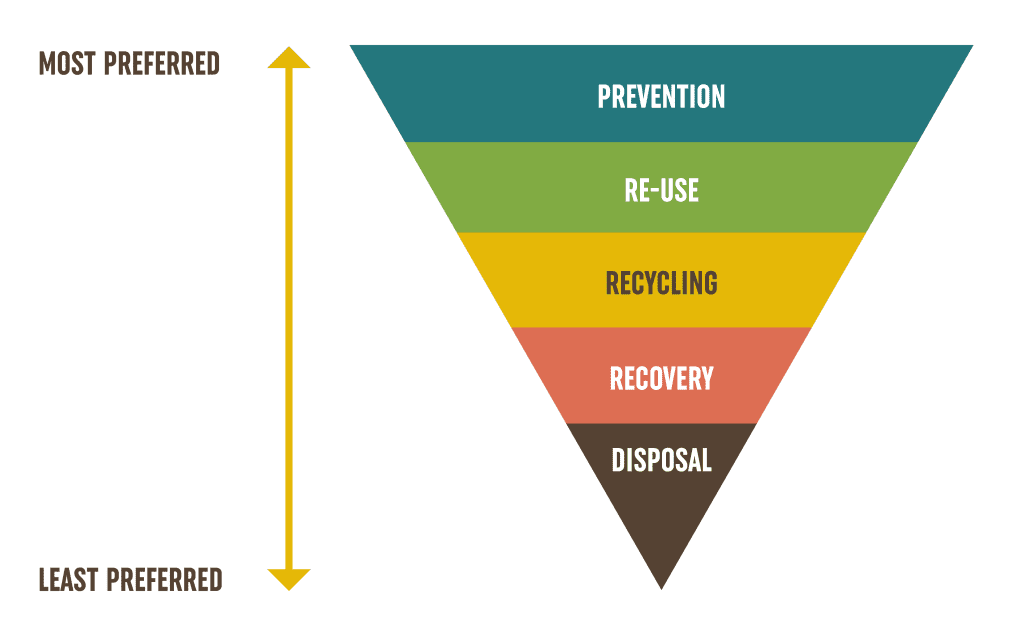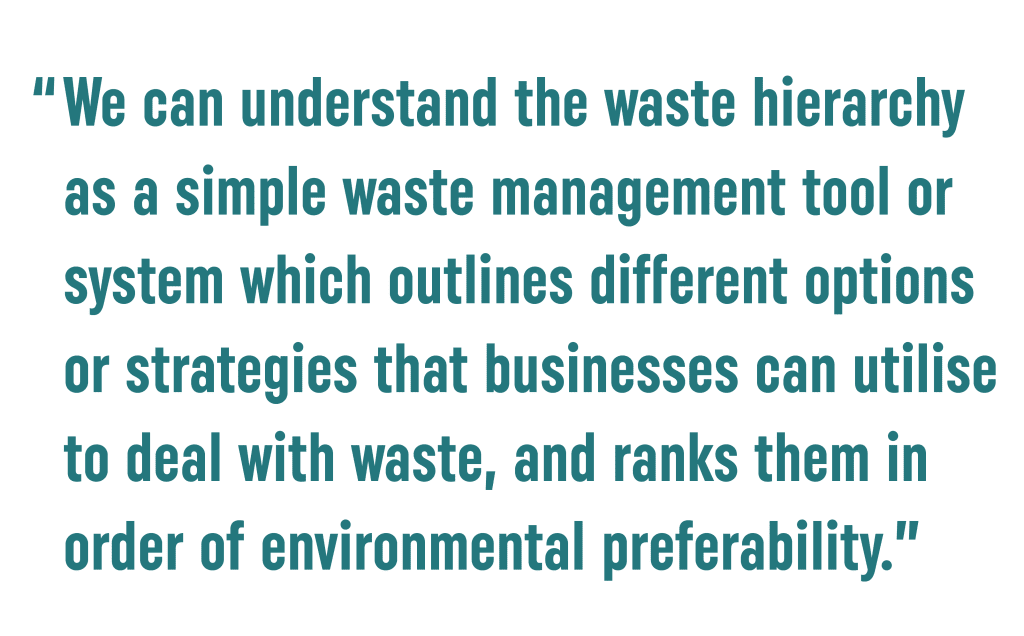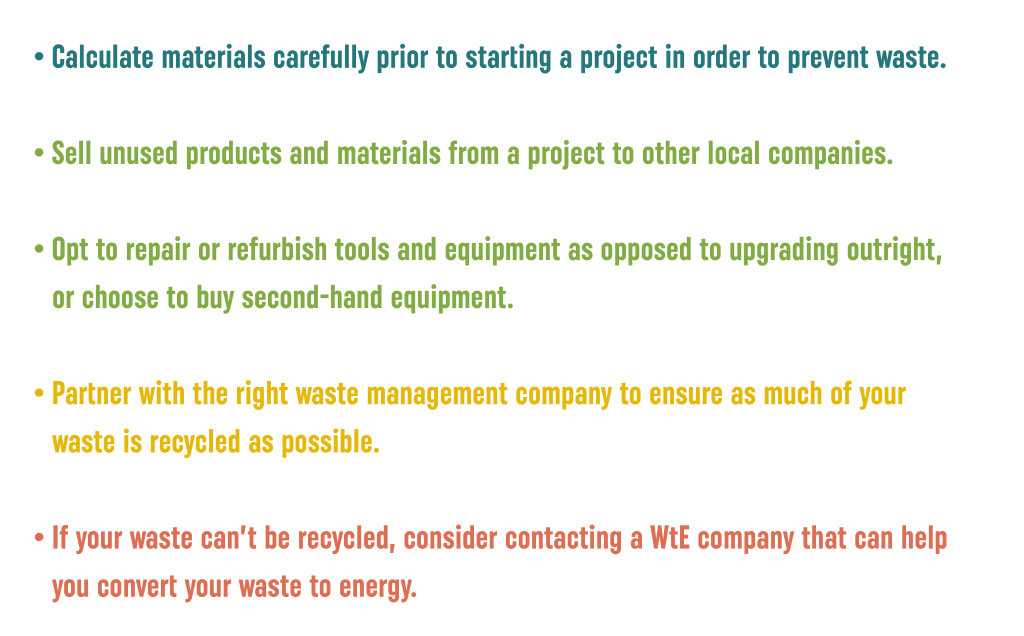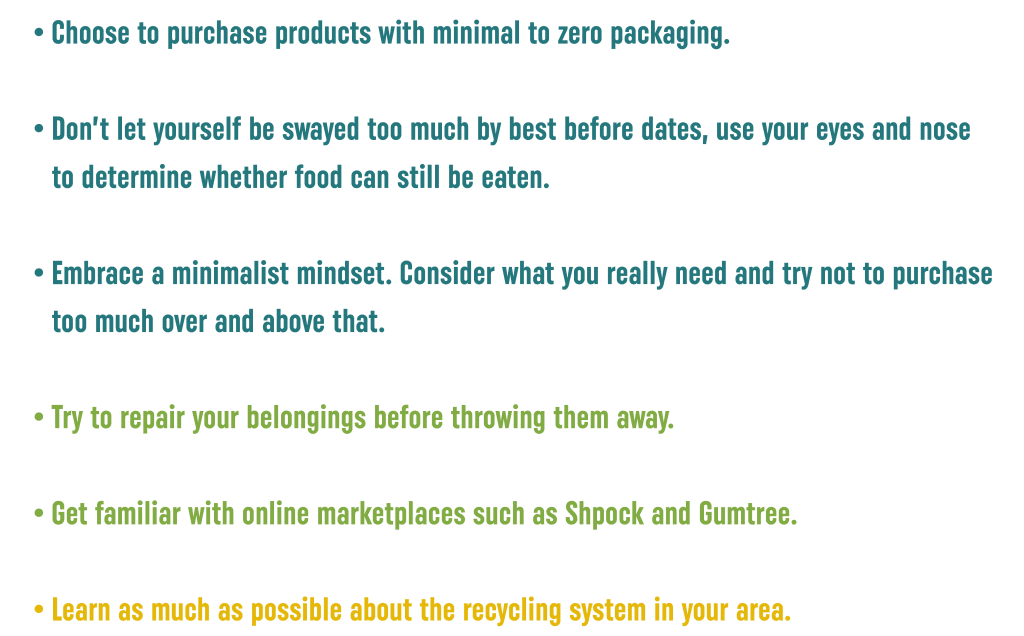
Understanding the Waste Hierarchy
Whether you’re a business owner or not, you are probably familiar with the concept of the waste hierarchy in some way. However, knowing the theory is one thing, and understanding how it applies to you specifically is something else entirely. In this guide, the team here at Brown Recycling want to help people find quick and simple ways to leverage the waste hierarchy to help contribute to a more eco-friendly future, whether you’re a business owner or just someone who wants to live a little greener.
What is the waste hierarchy?
Before we start covering specific applications, we first want to lay out exactly what the waste hierarchy is as a concept and break down each element.
We can understand the waste hierarchy as a simple waste management tool or system which outlines different options or strategies that businesses can utilise to deal with waste, and ranks them in order of environmental preferability.
Take a look at the image below to get a better idea of what the waste hierarchy looks like.


Prevention
At the top of the waste hierarchy we have prevention, the most environmentally optimal strategy. At this stage of the hierarchy, waste hasn’t even become waste yet at all. In fact, the whole idea here is to stop the day-to-day products and materials that we use becoming waste in the first place.
From a commercial perspective, prevention is all about being rigorous when it comes to calculating the materials we need for manufacturing and packaging, so as much of the materials that we purchase as possible are being utilised in our projects.
From a domestic perspective, we can practise prevention by choosing to purchase products with minimal to zero packaging, we can choose to ignore best-before dates on produce where appropriate, or even choose to buy produce without these dates to encourage the prevention of waste.
Another way that you can practise prevention is by choosing to live a more minimal lifestyle. Consumerism is one of the biggest drivers of high volumes of waste, and one of the main reasons we can quickly accumulate junk in our homes. By choosing to purchase little over and above what you need, you can start living and benefitting from a low-waste lifestyle.
Reuse
We can think of reuse as the ideal course of action once waste has been created. Reuse is about taking the products and materials that have become waste and trying to find new uses for them ourselves, or find other people that will have use for them.
As a business owner, this might mean selling unused materials from a project to another company, or even finding another use for those materials with a different project. It could also mean opting to repair tools and equipment once they’ve become faulty rather than simply upgrading to a new set right away. In a similar vein, you could choose to buy second-hand or refurbished products for your business at a fraction of the cost of new equipment.
From a domestic perspective, you can apply much of the same thinking as above. For example, you can choose to repair items like phones and laptops for as long as possible before upgrading; the same goes for non-electronic items in your home, such as tables, chairs and shelves.
If you really want to embrace a reuse mindset, another important thing to consider is selling things you no longer have use for through online marketplaces such as eBay, Shpock and Gumtree. While something might be waste to you, it could be exactly what someone else is looking for, so don’t write it off just yet, list it on an online marketplace first and see if someone bites!
Recycle
Recycling is the first port of call when it comes to waste disposal as it produces similar results to reuse, the key difference being when we recycle a product it can become something new entirely.
Recycling is brilliant because it reduces the overall amount of raw materials that we need to manufacture new items, because we can utilise pre-existing materials that are already out there in product form.
Staying on top of recycling is absolutely crucial for businesses not just because it’s good for the planet, but also because hitting recycling targets is crucial to stay compliant and competitive in the marketplace. Partnering with the right waste management company is key here, because they will be able to help you squeeze the most value out of your waste and ensure that whatever can be recycled will be recycled.
As a homeowner, you will of course be familiar with the recycling system in your area, but that doesn’t mean that you know everything there is to know. Each council will have a different way of doing things and some materials might be more readily recyclable than others, so make sure that you know exactly what materials you can recycle and when. This just means you can be as optimal as possible!
Recovery
If recycling isn’t an option, then recovery is the next best thing for the environment. Recovery is about converting waste to energy (WtE) through methods such as incineration, gasification and anaerobic digestion.
As a business, you will need to find the right WtE partner that you can trust to process your waste in the most environmentally friendly manner possible. You will also need to consider what kind of processing your waste will require. For example, if you own a restaurant and you generate lots of food waste, you might want to consider partnering with a company that specialises in anaerobic digestion, as they will be able to deal with your waste in the most efficient and eco-friendly way possible.
For homeowners, WtE isn’t really something you need to worry about on an individual level, however, it might be the case that your council already utilises this method to process household waste in your local area. If you would like to learn more about this, head to the website of your local council and search “waste to energy”.
Disposal
At the bottom of the waste hierarchy we have disposal, the least preferable option when it comes to handling waste. Disposing of waste is something that we should do reluctantly only when all of the options above have been exhausted.
For businesses, avoiding this course of action is all about applying the tips outlined throughout this guide where possible. And as we’ve mentioned previously, ensuring that you find the best possible local waste management provider to help you better understand your waste and recycle as much of it as you possibly can is absolutely vital to minimising the amount of waste that goes to landfill.
Let’s do a quick recap of some of the key takeaways from this guide for business owners:
- Calculate materials carefully prior to starting a project in order to prevent waste.
- Sell unused products and materials from a project to other local companies.
- Opt to repair or refurbish tools and equipment as opposed to upgrading outright, or choose to buy second-hand equipment.
- Partner with the right waste management company to ensure as much of your waste is recycled as possible.
- If your waste can’t be recycled, consider contacting a WtE company that can help you convert your waste to energy.

And now let’s do a quick recap of some of the key takeaways for homeowners:
- Choose to purchase products with minimal to zero packaging.
- Don’t let yourself be swayed too much by best before dates, use your eyes and nose to determine whether food can still be eaten.
- Embrace a minimalist mindset. Consider what you really need and try not to purchase too much over and above that.
- Try to repair your belongings before throwing them away.
- Get familiar with online marketplaces such as Shpock and Gumtree.
- Learn as much as possible about the recycling system in your area.

Brown Recycling is a leading total waste management company based in Stoke-on-Trent, offering both domestic skip hire and commercial waste management services. With decades of experience in the industry and a team of experts at our disposal, we always keep the waste hierarchy in mind when dealing with your waste to ensure that as little as possible goes to landfill.
Want to take advantage of our services? All you have to do is give us a call and a member of our team will take it from there.
This website uses cookies to enhance your browsing experience and deliver personalised ads. By clicking “Accept All Cookies”, you agree to the storing of cookies on your device to enhance site navigation, analyse site usage, and assist in our marketing efforts.
